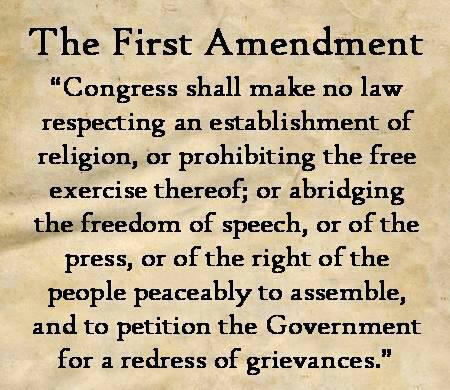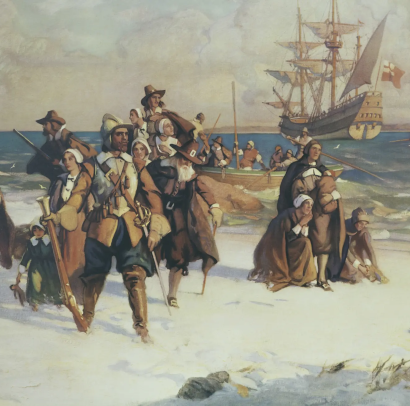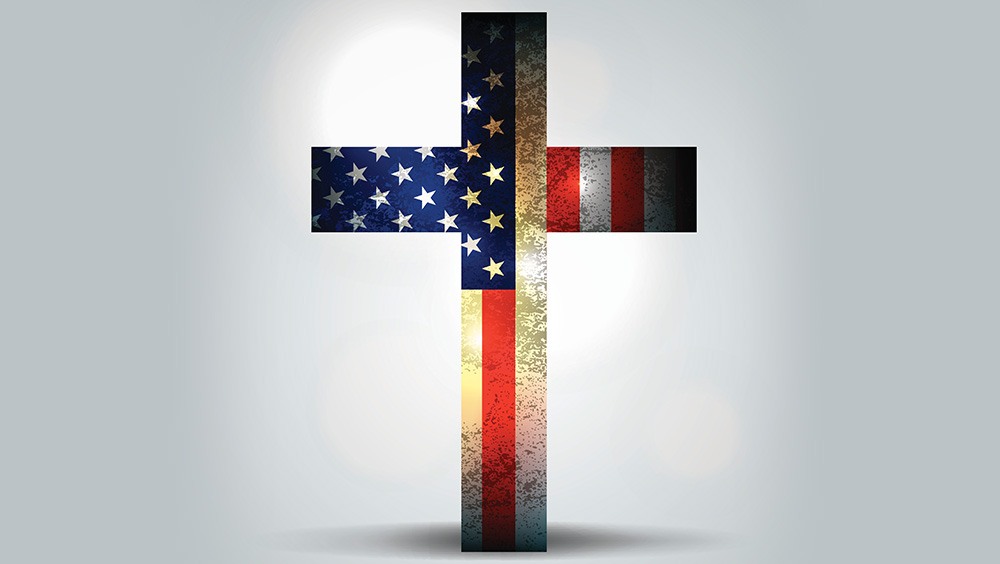by Rev. Dr. Dale Azevedo, Sr. Minister
A few weeks ago, during our first grab-bag sermon, I referred to Christian Nationalists adding the commentary that their ideals aren’t particularly Christian or patriotic. This was my sermon on kindness and humility where I discussed the “fruits of the Spirit” (June 23) as the Biblical test of true faithfulness. Following that sermon, one of our members approached me and asked if I could clarify what I meant by Christian Nationalism and who might fall into that category. I happily agreed to do so. However, as I began to put my thoughts together, I realized that it might make for a relevant blog instead of a one off response to an individual’s question. So here goes:
What is Christian Nationalism and why does it matter?
To understand Christian Nationalism, we must first understand nationalism and what is meant by the term. Nationalism is not patriotism.1 Patriotism is a love of one’s country and a celebration of all this is good about it. Nationalism, instead, is a belief that people can be easily categorized by one’s nation of origin and that one’s personal identity is defined by the general characteristics and moral code of that nation. For example, an American can be easily defined by a core set of values present in the larger culture and that they are distinctly different from an Iranian, a Pole, or a Brazilian. Often accompanied with this understanding is a belief that one’s own nationalism is inherently better than another’s and that it must be protected or it, along with its advantages, will be lost.2 We have witnessed a rise in nationalism in politics throughout the world in recent years.
So, what is Christian Nationalism?
Christian nationalism is a particular brand of nationalism that sees Christian faith as the primary characteristic that defines American identity. It states that American morals and culture are defined by our Christian roots and that those morals and values must be protected or America, as it has been, will cease to exist. Christian nationalism is one of the forces at the forefront of what many are calling our current culture war, and it has been becoming increasingly mainstream in American politics.

Why is it a problem?
Many would argue that our politics and social views ought to be informed by our religious faith. I would be one of these. Our faith should influence who we vote for, what laws we support, and what values we hold dear. If it doesn’t, then what purpose does our faith have? However, Christian nationalism isn’t just about encouraging people to vote according to their beliefs. It is about using the political system to enshrine one set of religious beliefs as law for all. It is about diluting or ending the separation of church and state by using the government’s power to give primacy to one interpretation of faith over any other.3 This is a threat to all Americans (Christian and non-Christian) whose views do not directly align with those in power.
How is it becoming mainstream?
In the past, Christian Nationalism has been characterized by those living on the extremes: white nationalists, white supremacists, and others often characterized as hate groups. However, over the past year we have seen an increasing number of examples of Christian nationalism in mainstream politics.

Louisiana: In June, Gov. Jeff Landry signed a bill that required state’s public schools, colleges, and universities to display a poster of the Ten Commandments in every classroom. The Ten Commandments have long been a lightning rod for political discourse. Many argue that they are the basis of our legal system and ought to be seen as a public document rather than a religious one. However, we cannot divorce the religious aspects of the Ten Commandments from the legal. They are, and always have been, a religious document. And as such, we have to ask ourselves which version of the Ten Commandments will be displayed and who will describe them to the students when questions are raised? Roman Catholics, Protestants, and Jews all have different versions of the Ten Commandments. We number them differently. We write them in different languages. And we interpret them very differently. Who determines which version is the legal version and which interpretation is allowed (and which is not!). This seems like a thinly veiled attempt to have the state give privilege to one faith, and one interpretation of that faith, over all others.
Oklahoma: Later in June, the state of Oklahoma went even farther than Louisiana when state school superintendent mandated Biblical education in all public schools for grades 5-12. This is both a violation of the authority granted to local school districts in Oklahoma to determine their own curriculum as well as a direct violation of the First Amendment of the Constitution which forbids government establishment of any religion. Again, it raises the great question of whose Biblical interpretation will be taught in the public schools? And can the Bible be taught as myth or folklore, or will it be taught as truth? And if so, who’s truth? This mandate is a clear example of Christian nationalism as it is intended to indoctrinate the children of Oklahoma into one state-sponsored faith and value system, even rejecting the diversity present in modern Christianity.
US House of Representatives: The US House of Representatives has always been characterized as the more rambunctious house of legislation and often had its share of political radicals.  Currently we have members such as Alexandria Ocasio-Cortez and Ilhan Omar as well as Marjory Taylor Green and Matt Gaetz sharing more extreme positions on the left and right respectively. This is nothing new. However, Mike Johnson, who is the current Speaker of the House, ideally a more moderate and powerful position, has openly embraced Christian nationalistic ideals. While he has refrained from calling himself a Christian nationalist, as other congress members have recently done,4 his talking points are not far from theirs. In a 2016 interview he was quoted as saying, “Over the last 60 or 70 years our generation has been convinced that there is a separation of church and state . . . most people think that is part of the Constitution, but it’s not.” And more recently, “The founders wanted to protect the church from an encroaching state, not the other way around.”5 All of this is intended to erode the long held American ideal of the separation of Church in state in favor of establishing one set of beliefs, a conservative Christian one, as the de facto rule of law in the U.S.
Currently we have members such as Alexandria Ocasio-Cortez and Ilhan Omar as well as Marjory Taylor Green and Matt Gaetz sharing more extreme positions on the left and right respectively. This is nothing new. However, Mike Johnson, who is the current Speaker of the House, ideally a more moderate and powerful position, has openly embraced Christian nationalistic ideals. While he has refrained from calling himself a Christian nationalist, as other congress members have recently done,4 his talking points are not far from theirs. In a 2016 interview he was quoted as saying, “Over the last 60 or 70 years our generation has been convinced that there is a separation of church and state . . . most people think that is part of the Constitution, but it’s not.” And more recently, “The founders wanted to protect the church from an encroaching state, not the other way around.”5 All of this is intended to erode the long held American ideal of the separation of Church in state in favor of establishing one set of beliefs, a conservative Christian one, as the de facto rule of law in the U.S.
The Barrington Times: Finally, a very local example – many of you are undoubtedly aware of the organized campaign against our town’s appointed DEI commission. It made weekly appearances throughout the winter and spring in the opinion section of the Barrington Times with letters to the editor listed under the names of various townspeople. Of all their letters attacking these appointed volunteers, one letter is most relevant for our conversation here. It was entitled “DEI’s Godless Agenda” and was published in early weeks of May.6 What I find most disturbing about this hurtful letter is that many of the members of the DEI commission are either clergy or active laypeople in our local churches and synagogue. The author(s) knew this, and still chose to attack them as “godless” as a part of their political attacks. Again, this carries the strong undertones of Christian nationalism, suggesting only one interpretation of faith is “godly” and acceptable in our national discourse.
America Was Founded on Religious Pluralism.
Reading through our national history, there is no doubt that the United States has roots deeply embedded in Christianity. Our own forebearers, the founders of our church, were decedents of the Puritans, the settlers who came over on the Mayflower and founded the Massachusetts Bay Colony. In the subsequent decades, colonists settled throughout the eastern seaboard, also bringing with them their Christian faith. The influence of these early Christian settlers on our national identity and values is undeniable. However, there was not just one understanding of Christianity in the colonies. There were different and conflicting ideas of faith between each of the colonies and each of  the cultural groups that came to the continent. And many of them came here to escape government sponsored religious persecution in their home country. That is why the founders of this country were so clear in providing for religious freedoms in our national and constitutional framework. Their Christian expressions were just as diverse as ours are today.
the cultural groups that came to the continent. And many of them came here to escape government sponsored religious persecution in their home country. That is why the founders of this country were so clear in providing for religious freedoms in our national and constitutional framework. Their Christian expressions were just as diverse as ours are today.
This early understanding of religious tolerance (on a national level, not always on a local level) opened the doors for people of other faiths to come to our nation and became part of the reason it is so great today. Christian nationalism seeks to rewrite this part of American history. It seeks to recast the nation we know and love, one that has experienced religious diversity from its earliest days, as a nation of one dominant faith, espousing one set of values, and relegating all else as un-American. This reality threatens not only our neighbors of other faiths or no faith, but it threatens us, faithful Christians who may interpret our beliefs differently than those in power. As Christians, as Americans, we must fight against this trend.
Where can I learn more?
You can see the many footnotes that I included in my blog. I encourage you to read further on this issue. One of the things I found most encouraging as I wrote this blog was the number of evangelical (i.e. often more conservative or traditional) Christians who wrote about the dangers of Christian nationalism. These are not just the concerns of progressive Christians. It is a concern for all Americans who wish to practice their faith without the intrusion of governmental opposition.
Here are some of the sources I found most interesting:
-
- “What Is Christian Nationalism?” by Paul D. Miller, Christianity Today, February 3, 2021
- “What Is Christian Nationalism, Exactly?” by David French, New York Times, Feb. 25, 2024
- “Christian Nationalism Explained: An Interview with Rutgers Professor Joseph Williams” by John Chadwick, rutgers.edu, Mar. 4, 2021
- “Christian Nationalism Doesn’t Just Threaten Our Nation – It Threatens Our Faith” Compassionate Conservative Revival
- “The Truth About Christian Nationalism” Evangelicals for Democracy
I hope you found this blog interesting and informative.
Blessings to you,
Dale
- “What Is Christian Nationalism?” by Paul D. Miller, Christianity Today, February 3, 2021
- “What Is Christian Nationalism, Exactly?” by David French, New York Times, Opinion, Feb. 25, 2024
- “Christian Nationalism Explained: An Interview with Rutgers Professor Joseph Williams” by John Chadwick, rutgers.edu, Mar. 4, 2021
- “Josh Hawley Doubles Down on Christian Nationalism Remarks” by Khaleda Rahman, Newsweek, Jul. 10, 2024 and “Americans are getting more accepting of Christian nationalism” by A. Shortle et. al. The Washington Post, Sept. 1, 2022
- “The Christian Nationalism of Speaker Mike Johnson” by A. Whitehead and S. Perry, TIME, October 27, 2023
- I recently tried to find the direct link to this letter on the Barrington Times website. Unfortunately, that letter no longer appears to be in their archive. I was only able to find follow-up letters which referenced the original letter by name. The original letter likely appeared in the May 3rd or May 10th edition of the Barrington Times.



